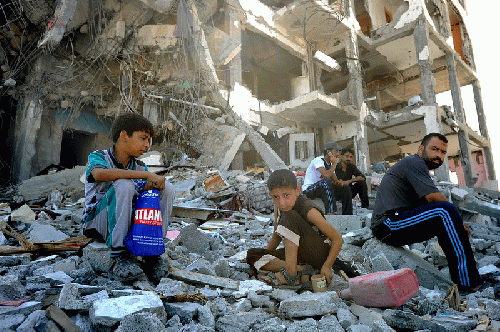But will it actually serve as an efficient formula for facilitating aid?
The construction of this pier, officially termed a "Joint Logistics Over-the-Shore" (JLOTS) operation, involves deploying a floating pier system that connects to a long causeway anchored to the shore. This setup is meant to allow for the effective transfer of supplies from ships to the Gaza coastline.
The pier is part of a broader strategy to mitigate severe humanitarian issues in Gaza, including food shortages and medical supply deficits. When operational, this system is anticipated to enhance the capacity for delivering aid significantly, with the capability to handle the transfer of up to 2 million meals per day to the region. This would supplement the more limited aid flow currently managed through traditional land routes, which have been severely disrupted by infrastructural damage and security issues.
Security for this operation will be managed in collaboration with the Israeli military, ensuring that the maritime aid corridor remains protected and functional. The U.S. military's construction efforts for the pier involve modular components assembled off-site and transported to the location, minimizing the need for a direct military presence on Gaza's shores. The completion of the pier is expected to not only provide immediate relief but also establish a more sustainable channel for humanitarian aid into Gaza.
The United States has historically played a pivotal role in providing humanitarian aid to regions affected by conflict, such as Gaza. This aid can significantly alleviate suffering through various means. The U.S. can deliver essential supplies like food, water, and medical aid, either directly or through support to NGOs and international organizations active in the area. In addition to immediate relief, U.S. aid efforts often encompass medical support, helping to bolster overwhelmed healthcare facilities with emergency services, medicines, and supplies.
U.S. assistance frequently extends to the reconstruction of vital infrastructure, including schools, roads, and hospitals, which is essential for long-term recovery and stability.
Beyond direct aid, U.S. diplomatic initiatives aimed at mediating and resolving conflicts can lead to ceasefires and peace agreements, ultimately facilitating safer and more effective delivery of humanitarian assistance. By addressing both immediate and long-term needs, U.S. humanitarian efforts not only cater to survival but also foster resilience and recovery among affected populations.
The United States has a long history of providing humanitarian aid to citizens of foreign countries during times of war. Here are a few notable examples:
World War II - The Marshall Plan: After World War II, the U.S. launched the Marshall Plan (officially the European Recovery Program) in 1948. This initiative aimed to rebuild war-torn Europe, revitalize its economy, and prevent the spread of Soviet communism. The plan provided more than $12 billion in economic assistance (equivalent to over $100 billion today) to Western European countries.
Korean War - Aid to South Korea: During and after the Korean War (1950-1953), the U.S. provided substantial humanitarian assistance to South Korea. This aid helped to manage the devastation and displacement caused by the war, and supported South Korea's recovery and economic development in the ensuing decades.
Vietnam War - Refugee Assistance: Throughout the Vietnam War, and particularly after the fall of Saigon in 1975, the United States offered significant humanitarian assistance to Vietnamese refugees, including those fleeing by boat (often referred to as "boat people"). This aid included resettlement programs, financial support, and other resources to help refugees integrate into new communities, primarily in the U.S. and other Western countries.
Bosnian War - Aid in the 1990s: During the Bosnian War (1992-1995), the U.S. was active in providing aid to the affected populations. This support was part of a larger international humanitarian effort that included food, medical supplies, and shelter to civilians caught in the conflict.
Syrian Civil War - Recent Aid Efforts: Since the outbreak of the Syrian Civil War in 2011, the United States has been a significant contributor to humanitarian aid efforts aimed at helping millions of displaced Syrians. This aid has included food, water, shelter, and medical aid to Syrians both within the country and in refugee camps in neighboring countries.
These examples, as well as the current effort in Gaza, reflect the ongoing American commitment to providing humanitarian support during conflicts, emphasizing both immediate relief and longer-term recovery and rebuilding efforts.
Hopefully, this new pier will indeed allow for greater aid to reach Palestinians in Gaza.






